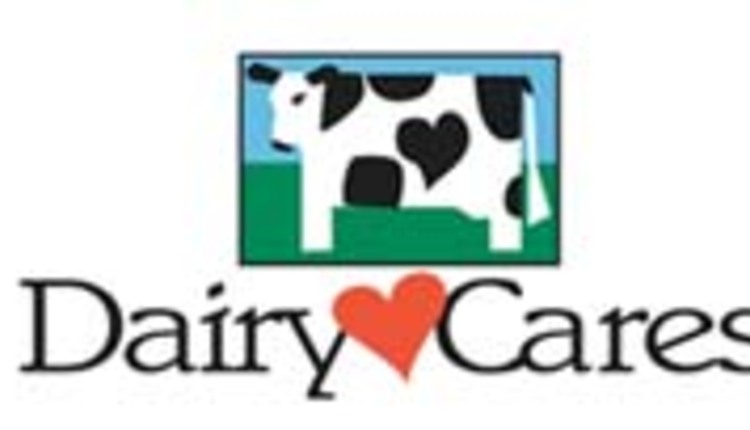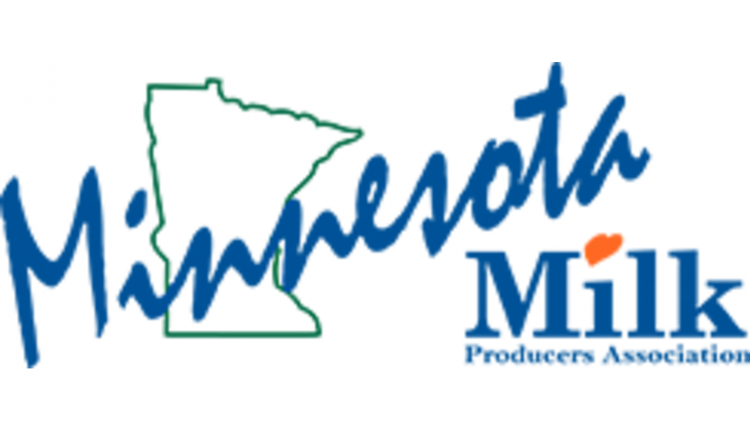The author started on a 43-cow rented farm and currently owns a successful crop and dairy operation along with a cheese factory in Waterloo, Wis.
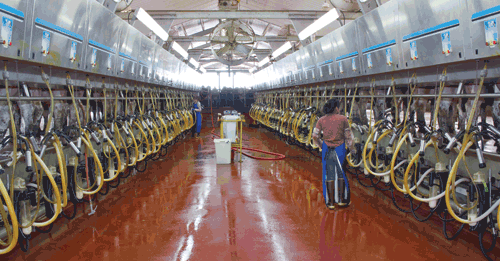
The dream of farming has become a reality for thousands around the world since the advent of agriculture. For perhaps even more, this dream has been snuffed out by an array of circumstances. But, how does one take the dream of farming and turn it into reality?
There is no one way to go about becoming a successful farmer. A vision towards achieving your goal, though, is an essential start. As a young dairyman, you most likely have a vision of owning your own farming operation. You may envision crops, calves and cows, but successfully owning and managing these assets involves a different three c's - character, capital and conditions.
Character is learned
Almost everyone reading this article has an agricultural background. Those years of your dad telling you to do it because it "builds character" can now be taken to the bank.
Do you have the honesty to procure a loan? Do you possess the character to work effectively with those in the industry? Do you have the mental ability to differentiate between working hard and working smart? Are you a grumbler or a doer? Do you have a record of successful leadership in your community, family or your farm? Have you succeeded beyond the basics? In the business of farming where so much is dependent on factors beyond your control, such as the weather and milk prices, remember that character is always in your control and will be there when needed.
Capital is earned
While your parents began building your character when you were young, they may not have been building your capital. If you want to own your own business, you need the raw materials to do so. Before you can think about having a productive herd, you need a plan for how you're going to feed it. This means having some initial capital.
Capital refers to the financial assets you can bring to a business. No banker will want to finance a business if they have all the risk, so cash is key. If you find yourself with empty pockets, an education is a good place to start, as it provides a skill set that will enhance your financial position. Are you willing to live modestly in order to save the money necessary to start a farming venture?
A young farmer who spends money on a shed full of toys instead of earning assets, such as a growing herd, may have a short farming career. Remember that no one starts out as the boss, and the experience and wages you can earn as an employee may be what you need to start an operation of your own.
Conditions are chosen
By working for someone else, not only will you get a financial boost, but you see the type of conditions you would like to have on your own operation or would never like to see again. Conditions are a reflection of what you are doing to position yourself for success.
For instance, your employer may operate with a free stall barn, while you feel a seasonal pasture-based operation may be more to your liking. You may have to relocate to make your vision bear fruit.
The most important thing to ask yourself is, can the conditions you choose as the basis of your operation bring you a profit? Milk is produced around the world in a variety of conditions. But no matter where you choose, make sure it is in the position to be a profitable venture.
The three c's can lead to profit
By combining your character with capital and favorable conditions, you are now in the position to start earning a profit. Earning assets are essential to control as a farmer. A producing herd is an example of an earning asset. Another example of an earning asset would be a pen of growing calves. Farmland, buildings and machinery are assets that offer a slower payback. Renting land or machinery is quite often much more cost-effective for a beginning operation.
It cannot be emphasized enough that you must know your cost of production. For starters, do a budget and utilize industry-wide data. Most of that can be found very easily just by reading articles such as those in Hoard's Dairyman.
The following two charts have been printed in Hoard's Dairyman within the past year. The examples show that, if you choose to have an average dairy operation, you will have a net income of about 63 cents per hundredweight. Many successful farms in 2011 have shown net incomes of five to 10 times this margin. If you have the ability to be above average, a greater margin may follow allowing you to operate a more profitable operation. A profitable farmer uses his profit to pay the principle and interest on his investment. Don't forget to factor in a wage for yourself in your budget.
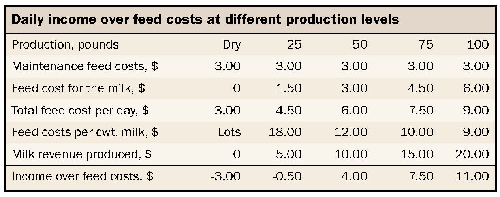
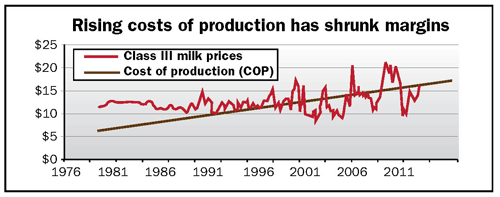
As a farmer, you are most likely an independent individual with production-based skills. This does not mean you should go at everything alone. By hiring an agricultural accountant, you will be in a position of fiscal accountability to yourself, your family and your banker. It would be ideal to establish this relationship prior to beginning your business. Knowing what is going on in your business and having a second opinion can be a priceless asset and relieve some of the stress that comes with owning your own business.
The preparation of an education, experience and a vision for success in conjunction with the three c's is the foundation of production agriculture; or any business for that matter. Perseverance and hard work won't hurt your career either. No matter how you choose to go about making your dream a reality, as long as you have character, capital and favorable conditions, you have a great start, and the crops, cows and calves will follow.

The dream of farming has become a reality for thousands around the world since the advent of agriculture. For perhaps even more, this dream has been snuffed out by an array of circumstances. But, how does one take the dream of farming and turn it into reality?
There is no one way to go about becoming a successful farmer. A vision towards achieving your goal, though, is an essential start. As a young dairyman, you most likely have a vision of owning your own farming operation. You may envision crops, calves and cows, but successfully owning and managing these assets involves a different three c's - character, capital and conditions.
Character is learned
Almost everyone reading this article has an agricultural background. Those years of your dad telling you to do it because it "builds character" can now be taken to the bank.
Do you have the honesty to procure a loan? Do you possess the character to work effectively with those in the industry? Do you have the mental ability to differentiate between working hard and working smart? Are you a grumbler or a doer? Do you have a record of successful leadership in your community, family or your farm? Have you succeeded beyond the basics? In the business of farming where so much is dependent on factors beyond your control, such as the weather and milk prices, remember that character is always in your control and will be there when needed.
Capital is earned
While your parents began building your character when you were young, they may not have been building your capital. If you want to own your own business, you need the raw materials to do so. Before you can think about having a productive herd, you need a plan for how you're going to feed it. This means having some initial capital.
Capital refers to the financial assets you can bring to a business. No banker will want to finance a business if they have all the risk, so cash is key. If you find yourself with empty pockets, an education is a good place to start, as it provides a skill set that will enhance your financial position. Are you willing to live modestly in order to save the money necessary to start a farming venture?
A young farmer who spends money on a shed full of toys instead of earning assets, such as a growing herd, may have a short farming career. Remember that no one starts out as the boss, and the experience and wages you can earn as an employee may be what you need to start an operation of your own.
Conditions are chosen
By working for someone else, not only will you get a financial boost, but you see the type of conditions you would like to have on your own operation or would never like to see again. Conditions are a reflection of what you are doing to position yourself for success.
For instance, your employer may operate with a free stall barn, while you feel a seasonal pasture-based operation may be more to your liking. You may have to relocate to make your vision bear fruit.
The most important thing to ask yourself is, can the conditions you choose as the basis of your operation bring you a profit? Milk is produced around the world in a variety of conditions. But no matter where you choose, make sure it is in the position to be a profitable venture.
The three c's can lead to profit
By combining your character with capital and favorable conditions, you are now in the position to start earning a profit. Earning assets are essential to control as a farmer. A producing herd is an example of an earning asset. Another example of an earning asset would be a pen of growing calves. Farmland, buildings and machinery are assets that offer a slower payback. Renting land or machinery is quite often much more cost-effective for a beginning operation.
It cannot be emphasized enough that you must know your cost of production. For starters, do a budget and utilize industry-wide data. Most of that can be found very easily just by reading articles such as those in Hoard's Dairyman.
The following two charts have been printed in Hoard's Dairyman within the past year. The examples show that, if you choose to have an average dairy operation, you will have a net income of about 63 cents per hundredweight. Many successful farms in 2011 have shown net incomes of five to 10 times this margin. If you have the ability to be above average, a greater margin may follow allowing you to operate a more profitable operation. A profitable farmer uses his profit to pay the principle and interest on his investment. Don't forget to factor in a wage for yourself in your budget.


As a farmer, you are most likely an independent individual with production-based skills. This does not mean you should go at everything alone. By hiring an agricultural accountant, you will be in a position of fiscal accountability to yourself, your family and your banker. It would be ideal to establish this relationship prior to beginning your business. Knowing what is going on in your business and having a second opinion can be a priceless asset and relieve some of the stress that comes with owning your own business.
The preparation of an education, experience and a vision for success in conjunction with the three c's is the foundation of production agriculture; or any business for that matter. Perseverance and hard work won't hurt your career either. No matter how you choose to go about making your dream a reality, as long as you have character, capital and favorable conditions, you have a great start, and the crops, cows and calves will follow.
This article appears on page 220 of March 25, 2013 issue of Hoard's Dairyman.
